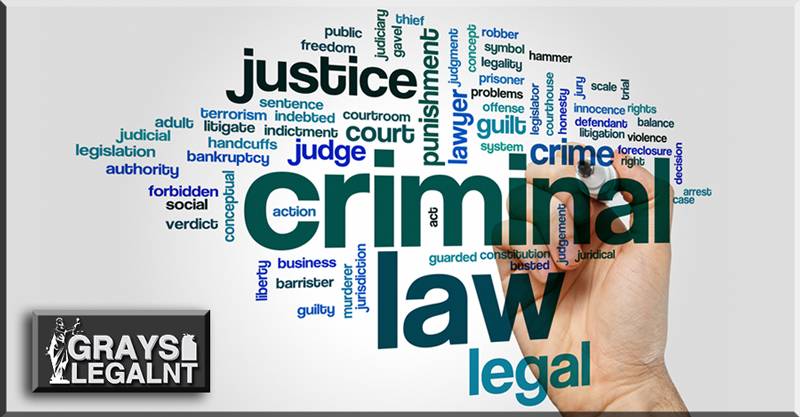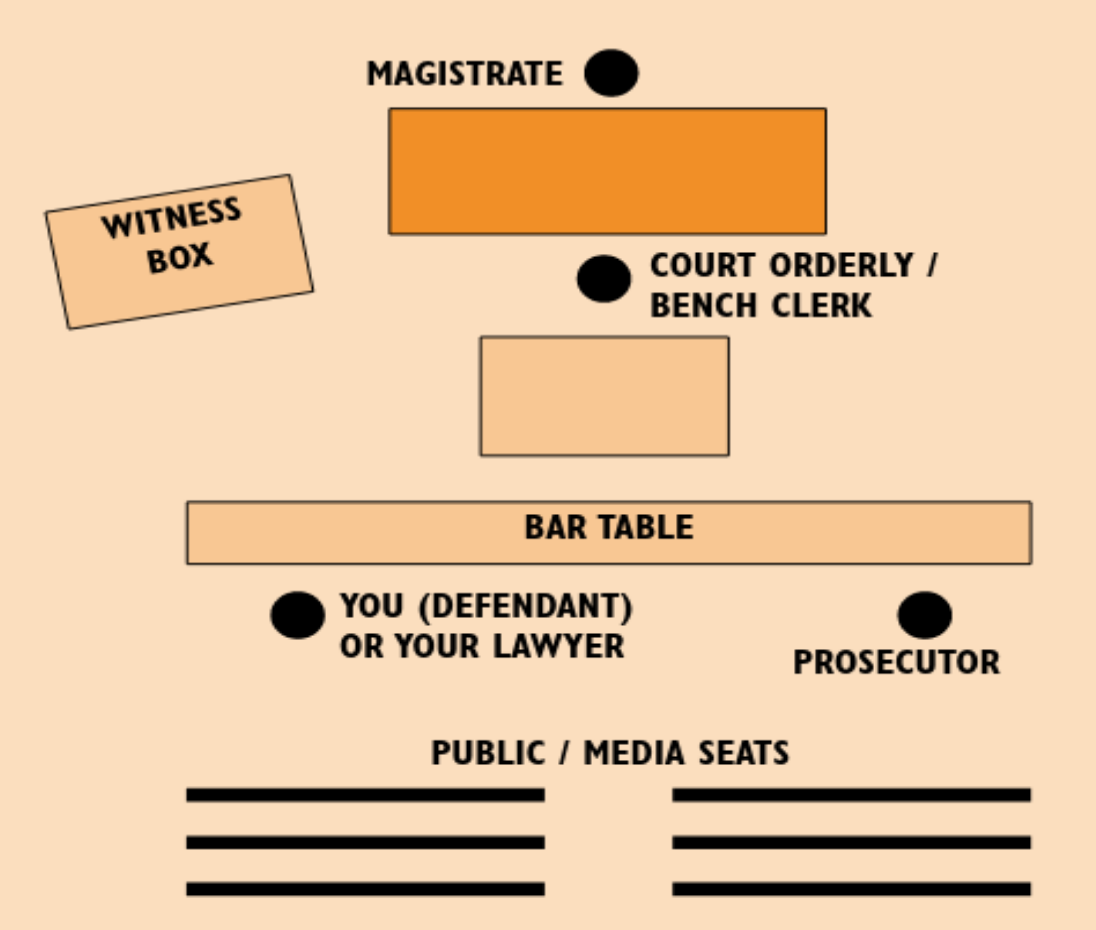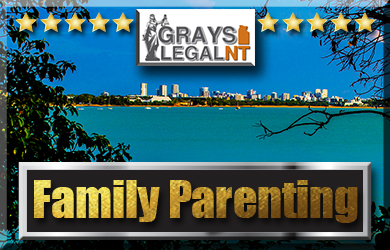




FAQ
Criminal Law
A warrant is a court document that gives the police (or sometimes somebody else) the power to do things like:
arrest you and take you to a court
search you, your car, where you live
take and keep your things found in a search
put you in jail.
A warrant from interstate can apply in the NT.
If you do not turn up at court.
If you do not pay a fine.
If you get an infringement notice (fine) from court or police and you don’t pay it, the Fines Recovery Unit (FRU) can make an enforcement order. Enforcement orders can suspend your license or car registration or require you to do a community work order. If you keep ignoring enforcement orders to do community work, a warrant might be issued to take you to jail.
You can ring up the police station or local court and find out. You will need to provide your name and date of birth. There are other ways that you can find out if there is a warrant. 1. Ask Grays Legal NT to find out if there is a warrant. 2. Go to the court or ring the court and ask if there is a warrant.
If you find out there is a warrant for your arrest, you should get legal advice as soon as possible. Grays Legal NT might advise you to go to court and ask the Judge to stop the warrant and give you bail so you don’t get locked up.
If you are arrested on a warrant, it might be harder to get bail because the Judge might think you will not come back to court.
If the police think someone is breaking the law where you live or work they may get a warrant to search these places. This is called a search warrant. Sometimes police can search your house or your car without a warrant.
What do I do if the police come with a warrant?
Read the warrant or ask the police to read it to you.
Make sure that it is your name, address and date of birth on the warrant.
Be polite to the police.
If police ask you, you have to give your name and address, but you don’t have to say
anything else unless you want to.
Call us as soon as you can for legal advice.
There can be serious consequences if you do not go to court on the day you are supposed to. In some cases (usually for the less serious offences like traffic offences) the court will hear the matter even if you are not there. This may mean that you get a more serious penalty for the offence you have been charged with. It also means you miss out on the opportunity to defend yourself or provide the court with your side of the story.
In other cases, the court will issue a warrant for your arrest. A warrant authorises police to arrest you wherever or whenever they find you and then bring you before the court.
If you are on bail, it means you have promised that you will appear in court on a specified day.
If you are on bail you must appear in court on the day (and on any other days) the court requests.
If you fail to appear a warrant for your arrest will be issued and you may not get bail granted again.
If you have an emergency and can’t get to the court, you must ring the court – and Grays Legal NT– and explain the circumstances. The court will then consider whether it will adjourn your matter until you can get to court or issue a warrant for your arrest.
Less serious offences are known as “summary offences”. Some examples are drink driving and common assault. Summary offences can be dealt with entirely by a Judge in the Local Court.
More serious offences, such as armed robbery or murder are known as “indictable offences”. Indictable offences are usually heard first in the Magistrates Court and are then referred to the Supreme Court to be heard before a Judge and Jury.
You can arrange to have your case moved from one court to another. If, for example, you are summonsed to the courthouse in Darwin, but you actually live in Katherine, it may be possible to have your matter heard in the Katherine Court House. You must contact the courthouse nearest to you before the day your matter is scheduled to be heard to arrange this.
Call Grays Legal NT, you can ask them for help. There may be valid reasons why it is not possible to have your case moved. Normally, the case will only be moved if you are pleading guilty.
Being charged with a criminal offence is a serious matter. You should always get legal advice about what to do, even if the offence seems trivial. Grays Legal NT can advise you about your plea, what you need to do before you go to court and what to do when appearing before a Magistrate.
There are courses available in the NT for people who have committed drink driving offences. There may also be other courses, such as anger management courses, that are relevant to your offence.
Attendance at a course shows the Magistrate that you have taken the police charge seriously and may help you get a more favourable sentence. They will also benefit you and your family in the future. Ask the course coordinator to provide you with a letter or certificate showing you have completed the course and give it to the Magistrate on the day.
Get counselling or support if the offence you committed happened because of alcohol or drug issues there are counsellors and support groups available who can help you. If you are getting counselling or have joined a support group make sure you tell the Magistrate. Your counsellor or someone from the support group may even come with you to court, or write a letter or report on your behalf. There are also special procedures for people who have offended because of problems with alcohol or drugs. You should ask Grays Legal NT about them. The “Contacts” section at the back of this booklet lists some of the organisations that provide support programs in the NT.
All court cases are scheduled for either 9am or 10am on the date specified on the summons. This does not mean that your matter will be heard at 9am or 10am, it just means that the court starts hearing cases from 9am onwards.
BE PREPARED TO WAIT SOME TIME AT THE COURT BEFORE YOUR MATTER IS HEARD. YOU MAY NEED TO TAKE A WHOLE DAY OFF WORK.
You should get to court a bit early (about half an hour to one hour before) to allow time to familiarise yourself with the courthouse and to find out what court room you are in. There will be a court list displayed on a notice board or a screen. The list will state the name of the person appearing in court and the charges they are in court to answer. It will tell you which court room you should appear in.
If you are unsure about where to find the court list or what court to go to you should ask the court reception (known as the “registry”). The names of youths are not displayed on the court list, you will need to enquire with the court registry about the charges and what court you should appear in. Some court houses have security areas you are required to pass through before you reach the court rooms or duty solicitor office. The security point is similar to a security check point at an airport.
DO NOT LEAVE THE COURT BUILDING BEFORE YOUR CASE IS HEARD BEFORE THE JUDGE
Dress Nicely.
You don’t need to wear a suit or formal clothes. You do need to wear clean, neat and tidy clothes and be nicely groomed. Take off your sunglasses and hat when you walk into the court room.
Turn off your phone. Mobile phones, tablets or other electronic devices must be turned off when you go into a court room.
Bring Support. It is a good idea to bring a friend, family or other support person (such as a counsellor or social worker) along to court with you. They can keep you company and help you if you feel nervous while you wait. If you have people with you it can be worthwhile to tell the Magistrate or Grays Legal NT as it shows that you take the matter seriously and are supported. Bring your notes. If you have written notes or organised character references make sure you bring them along to court with you.
Family Law
A Divorce is the legal recognition at the end of your marriage.
You can obtain a Divorce if your marriage has irretrievably broken down and you have been separated for no less than 12 months.
Despite popular belief, you do not have to prove who was “at fault” and you do not have to wait 12 months after you have separated to finalise your property settlement.
There is no one “legal” definition of a de facto relationship as there are different requirements for different legal purposes.
However, generally-speaking, a de facto relationship is between 2 persons (not legally married) of the same or opposite sex, have been together either for 2 years, have a child together or it would be unjust to not recognise the relationship.
Immediately upon separation, you are able to lodge an Application with the Department of Human Services (Child Support) to have maintenance/support assessed for your child if you are unable to reach an agreement with the child’s other parent.
A Parenting Order made by the Court typically deals with the following issues:
Allocation of parental responsibility (i.e. all of the duties, powers and responsibilities and
authority, which by law, parents have) in relation to the children (whether sole or joint);
Who the children are to live with;
Who the children are to spend time with;
Any other aspect of the care, welfare and development of the children, or any other aspect
of parental responsibility for the children.
When a Parenting Order is made, it is a legal requirement that parties follow the Order. If a parent does not follow a Parenting Order (in the absence of providing a reasonable excuse), it is called “contravening” a Parenting Order.
There are serious ramifications which flow from a contravention of a Parenting Order such that it is possible for the Court to order parents to attend programs, facilitate “make up” time, enter a bond, pay a fine or even 12 months imprisonment.
Despite popular belief, there are no “fixed” rules as to who a child shall live and who a child shall spend time with. The Court’s paramount consideration in determining which parent the child shall live with, and how much time the child shall spend with the other parent, is what is in the “best interests of the child.”
Contrary to popular belief, the process that the Court uses to determine a family law property settlement, is not a “mathematical” one. Unlike other countries, there is no starting rebuttable presumption that the parties’ net property pool is divided “50/50.”
Each relationship is unique.
The Court has a wide discretion in making property settlement orders and consequently, outcomes can vary considerably.
In other words, you could potentially get 5 different outcomes before 5 different Judicial Officers.
In practice, the Court generally follows a long-standing process involving a number of steps in determining the entitlement of each party to a relationship. These steps are as follows: 1. Make a list of all of the current assets, liabilities and superannuation of each of the parties and arriving at a net figure, or what becomes known as the “net property pool”. 2. Assess the contributions of each of the parties throughout the relationship, to the net property pool and to the welfare of the family. Contributions can be direct (eg. made by one of the parties’ to the relationship) or indirect (eg. made by one of the parties’ family members), financial (eg. earning an income) or non-financial (eg. renovations or improvements to a property done by one of the parties or made as homemaker or parent). 3. Assess the current and future circumstances of each of the parties and make adjustments arrived at.
the age and state of health of each of the parties;
the income earning capacity or discrepancy between the parties;
the length of the relationship and its effect on each of the parties earning capacities;
and
who will have the primary care of the children into the future.
4. For the Court to “step back” and assess whether the division achieved is appropriate or “just and equitable” in the circumstances.
Spousal maintenance is money paid by one spouse (i.e. the paying spouse) to the other (i.e. the receiving spouse) in circumstances where the receiving spouse is unable to support themselves “adequately,” following separation.
In determining whether or not spousal maintenance is appropriate, the Court will consider the following: 1. Whether the “threshold” is met (i.e. that there is a ‘need’ for one of the parties to be financially supported by the other); 2. The capacity by the other party to support the first party for a period of time; and 3. The extent of support required (what is ‘adequate’ in the circumstances) and the amount of time maintenance is required to be paid for.
What must be remembered, however, is that the Court is not required to ensure that either party has the same standard of living that they had before separation.
Upon separation, it is crucial to resolve the issue of property settlement and have any agreement formally recorded in a Consent Order (which is filed and approved by the Family Law Courts) or enter into a Binding Financial Agreement (“BFA”). Unless a property settlement is determined by a Court Order or is properly recorded in a Consent Order or a BFA, then the issue of property settlement is always potentially “alive”.
You must resolve or commence proceedings for property settlement and/or spousal maintenance within 12 months after you have obtained your Divorce.
Otherwise, you must seek leave of the Court to do so (which is only granted in exceptional circumstances). In our experience, this is a difficult, costly and lengthy process.
A financial claim at the end of a de facto relationship must be filed within 2 years after the date upon which the de facto relationship ended.
Upon separation, it is crucial to examine the terms of your Will (if you have one) or have a new Will prepared to properly reflect your change in circumstances.
It is also important to examine who is the named beneficiary in your Superannuation policy and whether you wish to change the beneficiary (as in many cases, this will be your spouse).
You should also examine any Powers of Attorney and/or Enduring Powers of Attorney you have put in place during your relationship. In most instances, it may be appropriate to revoke those Powers of Attorney immediately after separation.
Contact Child Support and find out what your options are. These will vary depending on your circumstances, but chances are that you will be able to pay less child support.
Contact Child Support on 131 272 or see www.dhs.gov.au. It is important to act quickly, because Child Support often cannot back-date assessments to reflect changed circumstances. You may find it helpful to get legal advice about your situation.
Both parents have an obligation to financially support their children until they are at least 18 years of age, even after separation. That legal obligation does not change when one or both parents’ re-partner. A parent’s new partner does not have a legal obligation to support another person’s child.
If a child turns 18 while still in secondary school, the carer parent can ask Child Support to continue the child support assessment until the child completes the current school year. This application must be made before the child turns 18, and only runs until the end of that school year.
Once the child support assessment ends, either a private agreement must be reached or the carer/parent or young person can make an application to the Court for an order.
The children have a right to know and to be cared for by both parents. However, when a parent needs to move away and that move may affect the children’s ability to spend time with and communicate with the other parent on a regular basis, a number of factors need to be considered:
1. When there are court orders about the child You will need to look at the court order to see whether the move will breach the order. For example, if the order says your children are to spend time each weekend with the other parent and you plan to move from Darwin to the Gold Coast, you would probably be in breach if you moved. You would then need to have the orders varied either with the other parent’s consent or by the Court before you move.
2. When there are no court orders about the child You will not be breaching any orders by moving. However, if there is an informal agreement or parenting plan for your children to spend time with the other parent, then the other parent can ask the Court for an order which stops you from leaving the area with the children. Above all, the Court will look at what is in the best interests of the child.
If you have an order that the children live with you or spend time with you and the children have been taken or not returned, you need to apply to the Court for a recovery order. This order allows the police (both state and federal) to find and return your children to you. If you do not have an order that the children live with or spend time with you, you need to apply to the Court for such an order, as well as a recovery order. This can be done simultaneously.
Sometimes in an emergency the Court may give these orders ex parte, that is without the other parent being at court. If you are worried that the children might be taken out of Australia you should put the children’s names on the Airport Watch List. You will need to apply to the Court to place the children on the Watch List and send a copy of the application and any court orders made to the Federal Police.
If you find yourself in this situation you should phone the Federal Police and find out what they require.
Any more questions? Feel free to email us!
We'd really love to hear from you so why not drop us an email and we'll get back to you as soon as we can.


How we operate for you!
Grays Legal specialises in Criminal and Family Law. We bring an unparalleled depth of knowledge to your legal needs and provide strategy about the best way to move forward. Your case is important to us.

We will weather the storm with you!
Our six specialist fields of representation are DUI, Traffic Infringements, Sexual Assault, Divorce, Family Parenting & Family Property!

Get In Touch
We are here to serve you and are proud to have been protecting the rights of the people for 19 years. Call today and schedule a free consultation.

Free Consultation
We offer 30 minutes of free consultation as Darwin solicitors to any and all prospective clients, no pressure, just information. Get in touch today.

Starting Your Case
Led by Principal Solicitor Thelma Gray, our team will offer guidance and support while fighting to achieve the best possible outcome for your life.

We Are The Best Reviewed Law Firm In Darwin!

Fantastic compassionate, professional & highly skilled lawyer! Best legal firm in Darwin 💯👍

Thelma is an absolute gem, fantastic, experienced, professional lawyer. Was available anytime for my questions when I didn't understand something, she explained in plain English. Thelma is so down to earth and will always fight for what is right.
Highly recommended. Thank you for everything, so glad it's all over.

Thelma Gray is a fantastic lawyer, she fights hard for you, leaves no stone unturned and she thinks outside the box. I found her to be very personable and compassionate unlike most lawyers out there. If you want a determined Lawyer who wont back down or be pushed around Thelma is the person you want for your day in court.

Verry good legal representation helped me alot would recommend them to anyone dealing with family issues they are amazing

Grays Legal have let us through multiple family law issues and civil issues, we are lucky to have found you when we did. Thank you!

Awesome lawyer very strong and not afraid to take on the BIG people. Highly recommend

Absolute bulldog of a lawyer. Will fight for you and is very client focused.













































